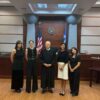I FEEL I should comment on the recent news story titled “Non-NMD wife seeks 55-year leasehold interest in late husband’s property” on your issue of March 30, 2021, and now more recently, on April 15, 2021 issue saying about the same thing.
First, I am assuming that the decedent (late husband) died intestate — that is, the decedent left with no will. The case In re Estate of Jose Celis Camacho, 2012 MP 8, ¶11 (NMI Supreme Court), the Supreme Court said that upon the death of a person intestate, title to his real property immediately passes to his heirs, whoever they might be. So now it becomes a question of who are the heirs of the widow’s decedent.
The widow’s attorney, Joseph Horey, quoted 8 CMC §2411 which states: “Whenever a person not of NMD takes title to real property under this code, he or she shall take the maximum allowable legal interest in the real property and the remaining interest if any shall vest in the next closest heirs or devisees who can legally take title”, implying that the widow is the person taking “title” and therefore she can take a 55-year leasehold interest in her decedent husband’s real estate he left behind that he acquired inter vivos (roughly, by his own act while alive) or by inheritance (by operation of law). Problem with this for the non-NMD widow is that “title” is taken only by NMDs who can take it (title) by inheriting a life estate or the fee simple estate — in other words, the freehold estate or interest. A person taking a 55-year leasehold interest takes just that: the leasehold only and not the freehold, with the freehold interest remaining in the landlord who has the “title” to the leased land.
Worse for the widow, the case Estate of Imamura, 1997 MP 7, 5 N.M.I. 60, 63-64 (1997)(NMI Supreme Court) does not allow for a 55-year leasehold to be carved out for non-NMDs. The only possible way out of this in a probate case is that the NMD “heirs” must agree with the non-NMD widow, under 8 CMC §2804, that she may take the “apparent fee simple” or “apparent life estate” interest in the lands to be the apparent owner of record — the executor or administrator under this provision of the probate code must accept what has been agreed upon by the heirs and the inheriting non-NMD. This is how the non-NMD decedent in my case, In re the Estate of Norberto Eduardo Pangelinan, 2020 MP 19 (NMI Supreme Court), got to become the “apparent owner of record” in the property distribution of our grandfather’s (Jose Wilson Pangelinan) probated estate — but caveat, being the apparent owner of record does not make a non-NMD an NMD. Thus, when the non-NMD widow above, assuming that all the NMD decedent’s heirs agree with her to become the apparent owner of record, becomes deceased, nothing goes to anyone of her apparent ownership of record, if the title gets challenged — because in a Roberto (2003 MP 16) case, the widow acquired only a bare right of possession that terminates when she dies. But if the title is not challenged, then the apparent ownership of record goes to the next closest heirs who are NMDs arising in them as true owners, but if there are no such NMDs, the government takes the title — yes, everything.
Before proceeding further forward, it is important to bring in the six-year statute of limitations when questions of Article XII of the CNMI Constitution is implicated — this statute is straight forward, there is no equitable tolling and it begins to run immediately regardless of concealment or fraud by grantee or inheritor, and completely runs six years after the cause of action commenced. The only exception to it is that the grantee or inheritor must have been in possession or seized of the property conveyed or inherited for the six years limitation to begin. That is, if the land is vacant or leased by a lessee — he, as non-freeholder, can never be seized of the land (only freeholders can hold the seisin) and that vacant land is not in actual possession of anyone: a person, even he has a color of title, dumping trash or an anonymous person storing articles on the premises is not a possessor of the land, rather he must build structures, make improvements and actually possessing it, because this way, to say differently, he unfurls his flag, flies it high above and tells the whole world that he is the OWNER of the land. When anyone of these is not present, the statute is inapplicable. Further, it does not apply, because it is an affirmative defense, when the grantee or inheritor brings an action against the grantor or presumably the party who actually should be the inheritor or the reversionary or remainder freeholder of the land — this is the case with me, the lawsuit I counterclaimed a quiet title action prevented the rigid six-year statute of limitations to be asserted against me as a defendant (I am forever grateful for that lawsuit against me because it worked in my favor which the complainants could not plead).
But there is more to this. The NMI Supreme Court have interpreted the provision of 8 CMC §2411 in my case to mean that the intestate, non-NMD decedent (assuming arguendo that it is the widow above when she dies) must have acquired the real property under this section of the probate code, and not by inter vivos conveyance to her, to be applicable — that is, her “next closest heirs” who can take title takes the remaining interest, presumably the collateral relatives that do not extend beyond the surviving siblings only. Thus, although I am a relative of the decedent in my case, the high court said I had no standing to make a claim in the probate case because the probate code does not consider first-cousins as “next closest heirs,” and because the intestate, non-NMD decedent did not acquire the so-called estate’s assets under 8 CMC §2411 but by a 1989 inter vivos conveyance to him from his father. This means that the decedent’s estate did not own the assets that were “conveyed” to him in 1989. I must say the high court made the right decision, because if it had been otherwise the Commonwealth would be the taker of the title to the ancestral lands that were the subject of the probate case. In that case, however, the high court took judicial notice of my amended counterclaim of quiet title action to the ancestral lands that was pending before it in Pangelinan v. Pangelinan, Supreme Court No. 2020-SCC-0005-CIV, and said that that was the appropriate vehicle to claim ownership to the ancestral lands. Service and filing of briefs have already been closed and the case will now proceed to the next stage.
The difference between my case and the widow’s case published above is that in her case her deceased husband was an NMD and had an NMD issue to inherit. In my case, the widow and her deceased husband were non-NMDs, including the deceased’s issue. The deceased acquired his “title” by an inter vivos conveyance and not by 8 CMC §2411 of the probate code as the NMI Supreme Court noted. Because he was non-NMD, the conveyance to him was void ab initio under Section 6 of Article XII of the NMI Constitution, and neither did he inherit anything from his father he survived upon his father’s death because the constitutional section, too, prohibits acquisition by inheritance.
So, it all boils down to this in my case: upon my decedent cousin’s father’s death all of his (cousin) father’s ancestral lands, the title thereto, went immediately to his siblings who survived him — this is important, because siblings who predeceased widow’s decedent’s deceased father are not considered “heirs” under 8 CMC §2902(c) where the non-NMD widow (my aunt) and her deceased husband (my uncle) were non-NMDs. My NMD father survived his brother, I (NMD) survived my father, and as the only person sued by complainants and who counterclaimed the lawsuit in Pangelinan v. Pangelinan, I am entitled to get every ancestral lands heretofore belonging to my uncle that the suing non-NMD complainants (decedent husband’s widow and immediate issue) could not inherit or acquire from him. Simple!
The writer is a resident of Kagman, Saipan.












